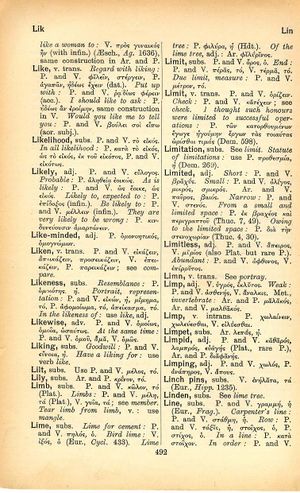line: Difference between revisions
ἐβόα καὶ βαρβαρικῶς καὶ Ἑλληνικῶς → shouted out both in Persian and Greek, shouted out in the barbarian tongue and in Greek
m (Text replacement - "<b class="b2">Thesm.</b>" to "''Thesm.''") |
mNo edit summary |
||
| Line 1: | Line 1: | ||
{{Woodhouse1 | {{Woodhouse1 | ||
|Text=[[File:woodhouse_492.jpg|thumb|link={{filepath:woodhouse_492.jpg}}]]'''subs.''' | |Text=[[File:woodhouse_492.jpg|thumb|link={{filepath:woodhouse_492.jpg}}]]'''subs.''' | ||
P. and V. [[γραμμή]], ἡ (Eur., ''Frag.''). | P. and V. [[γραμμή]], ἡ (Eur., ''Frag.''). | ||
[[carpenter's line]]: P. and V. [[στάθμη]], ἡ. | |||
[[row]]: P. and V. [[τάξις]], ἡ, [[στοῖχος]], ὁ, P. [[στίχος]], ὁ. | |||
[[in a line]]: P. [[κατὰ]] [[στοῖχον]]. | |||
[[in order]]: P. and V. [[ἑξῆς]], [[ἐφεξῆς]]. | |||
[[line to mark the winning point]]: Ar. and V. [[γραμμή]], ἡ. | |||
[[fishing line]]: V. [[ὁρμιά]], ἡ. | |||
[[line of a fishing net]]: V. [[κλωστὴρ]] [[λίνου]]. | |||
[[wrinkle]]: Ar. and P. [[ῥυτίς]], ἡ. | |||
[[line of battle]]: P. and V. [[τάξις]], ἡ, P. [[παράταξις]], ἡ, Ar. and V. [[στίχες]], αἱ. | |||
[[file]], [[row]]: P. and V. [[στοῖχος]], ὁ. | |||
[[troops in line of battle]]: P. [[φάλαγξ]], ἡ. | |||
[[draw up in line]], v.: Ar. and P. [[παρατάσσειν]]. | |||
[[in line]]: of [[ship]]s, P. [[μετωπηδόν]], opposed to [[in column]], of [[troop]]s, P. [[ἐπὶ]] [[φάλαγγος]] (Xen.). | |||
[[win all along the line]]: P. [[νικᾶν]] [[διὰ]] [[παντός]]. | |||
[[break the enemy's line of ships]], v.: P. [[διεκπλεῖν]] (absol.); see [[break]]. | |||
[[lines of circumvallation]]: P. [[περιτείχισμα]], τό, [[περιτειχισμός]], ὁ, | |||
[[line of poetry]]: Ar. and P. [[στίχος]], ὁ, [[ἔπος]], τό. | |||
[[line of march]]: P. and V. [[ὁδός]], ἡ, [[πορεία]], ἡ. | |||
[[family]]: P. and V. [[γένος]], τό, V. [[σπέρμα]], τό, [[ῥίζα]], ἡ, [[ῥίζωμα]], τό; see [[family]]. | |||
[[being thus related through the male and not the female line]]: P. [[πρὸς]] [[ἀνδρῶν]] [[ἔχων]] [[τὴν]] [[συγγένειαν]] [[ταύτην]] [[καὶ]] οὐ [[πρὸς]] [[γυναικῶν]] (Dem. 1084). | |||
[[line of action]]: P. [[προαίρεσις]], ἡ. | |||
[[draw the line]], [[lay down limits]], v.: P. and V. [[ὁρίζειν]] (absol.). | |||
[[strike out a new line]]: Ar. and P. [[καινοτομεῖν]] (absol.). | |||
[[the founders must know the lines they wish poets to follow in their myths]]: P. [[οἰκισταῖς]] [[τοὺς]] [[τύπους]] [[προσήκει]] [[εἰδέναι]] ἐν [[οἷς]] [[δεῖ]] [[μυθολογεῖν]] [[τοὺς]] [[ποιητάς]] (Plat., ''Rep.'' 379A). | |||
[[it's a pretty scheme and quite in your line]]: Ar. τὸ [[πρᾶγμα]] [[κομψὸν]] [[καὶ]] [[σφόδρʼ]] ἐκ [[τοῦ]] [[σοῦ]] [[τρόπου]] (''Thesm.'' 93). | |||
'''v. trans.''' | '''v. trans.''' | ||
[[fill]], [[man]]: P. and V. [[πληροῦν]]. | |||
[[guard]]: P. and V. [[φυλάσσειν]], [[φρουρεῖν]]. | |||
[[mark]], [[furrow]]: V. [[χαράσσειν]]. | |||
}} | }} | ||
Revision as of 11:23, 24 February 2020
English > Greek (Woodhouse)
subs.
P. and V. γραμμή, ἡ (Eur., Frag.).
carpenter's line: P. and V. στάθμη, ἡ.
row: P. and V. τάξις, ἡ, στοῖχος, ὁ, P. στίχος, ὁ.
in order: P. and V. ἑξῆς, ἐφεξῆς.
line to mark the winning point: Ar. and V. γραμμή, ἡ.
fishing line: V. ὁρμιά, ἡ.
line of a fishing net: V. κλωστὴρ λίνου.
line of battle: P. and V. τάξις, ἡ, P. παράταξις, ἡ, Ar. and V. στίχες, αἱ.
file, row: P. and V. στοῖχος, ὁ.
troops in line of battle: P. φάλαγξ, ἡ.
draw up in line, v.: Ar. and P. παρατάσσειν.
in line: of ships, P. μετωπηδόν, opposed to in column, of troops, P. ἐπὶ φάλαγγος (Xen.).
win all along the line: P. νικᾶν διὰ παντός.
break the enemy's line of ships, v.: P. διεκπλεῖν (absol.); see break.
lines of circumvallation: P. περιτείχισμα, τό, περιτειχισμός, ὁ,
line of poetry: Ar. and P. στίχος, ὁ, ἔπος, τό.
line of march: P. and V. ὁδός, ἡ, πορεία, ἡ.
family: P. and V. γένος, τό, V. σπέρμα, τό, ῥίζα, ἡ, ῥίζωμα, τό; see family.
being thus related through the male and not the female line: P. πρὸς ἀνδρῶν ἔχων τὴν συγγένειαν ταύτην καὶ οὐ πρὸς γυναικῶν (Dem. 1084).
line of action: P. προαίρεσις, ἡ.
draw the line, lay down limits, v.: P. and V. ὁρίζειν (absol.).
strike out a new line: Ar. and P. καινοτομεῖν (absol.).
the founders must know the lines they wish poets to follow in their myths: P. οἰκισταῖς τοὺς τύπους προσήκει εἰδέναι ἐν οἷς δεῖ μυθολογεῖν τοὺς ποιητάς (Plat., Rep. 379A).
it's a pretty scheme and quite in your line: Ar. τὸ πρᾶγμα κομψὸν καὶ σφόδρʼ ἐκ τοῦ σοῦ τρόπου (Thesm. 93).
v. trans.

